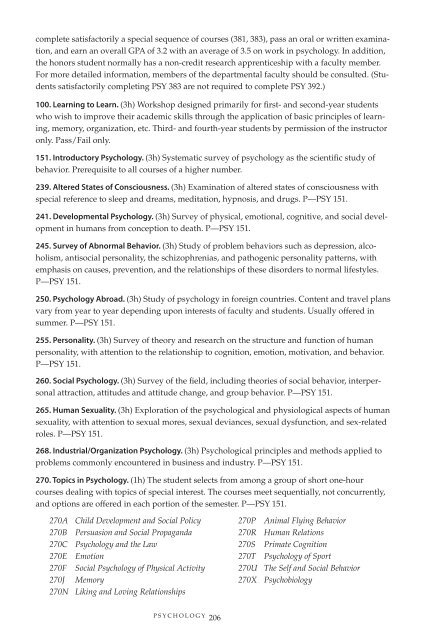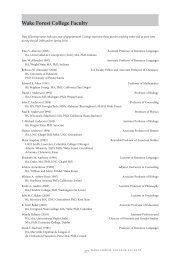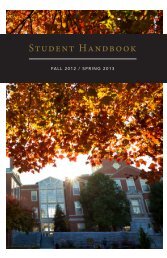theundergraduateschoo ls - Wake Forest University
theundergraduateschoo ls - Wake Forest University
theundergraduateschoo ls - Wake Forest University
Create successful ePaper yourself
Turn your PDF publications into a flip-book with our unique Google optimized e-Paper software.
complete satisfactorily a special sequence of courses (381, 383), pass an oral or written examination,<br />
and earn an overall GPA of 3.2 with an average of 3.5 on work in psychology. In addition,<br />
the honors student normally has a non-credit research apprenticeship with a faculty member.<br />
For more detailed information, members of the departmental faculty should be consulted. (Students<br />
satisfactorily completing PSY 383 are not required to complete PSY 392.)<br />
100. Learning to Learn. (3h) Workshop designed primarily for first- and second-year students<br />
who wish to improve their academic skil<strong>ls</strong> through the application of basic principles of learning,<br />
memory, organization, etc. Third- and fourth-year students by permission of the instructor<br />
only. Pass/Fail only.<br />
151. Introductory Psychology. (3h) Systematic survey of psychology as the scientific study of<br />
behavior. Prerequisite to all courses of a higher number.<br />
239. Altered States of Consciousness. (3h) Examination of altered states of consciousness with<br />
special reference to sleep and dreams, meditation, hypnosis, and drugs. P—PSY 151.<br />
241. Developmental Psychology. (3h) Survey of physical, emotional, cognitive, and social development<br />
in humans from conception to death. P—PSY 151.<br />
245. Survey of Abnormal Behavior. (3h) Study of problem behaviors such as depression, alcoholism,<br />
antisocial personality, the schizophrenias, and pathogenic personality patterns, with<br />
emphasis on causes, prevention, and the relationships of these disorders to normal lifestyles.<br />
P—PSY 151.<br />
250. Psychology Abroad. (3h) Study of psychology in foreign countries. Content and travel plans<br />
vary from year to year depending upon interests of faculty and students. Usually offered in<br />
summer. P—PSY 151.<br />
255. Personality. (3h) Survey of theory and research on the structure and function of human<br />
personality, with attention to the relationship to cognition, emotion, motivation, and behavior.<br />
P—PSY 151.<br />
260. Social Psychology. (3h) Survey of the field, including theories of social behavior, interpersonal<br />
attraction, attitudes and attitude change, and group behavior. P—PSY 151.<br />
265. Human Sexuality. (3h) Exploration of the psychological and physiological aspects of human<br />
sexuality, with attention to sexual mores, sexual deviances, sexual dysfunction, and sex-related<br />
roles. P—PSY 151.<br />
268. Industrial/Organization Psychology. (3h) Psychological principles and methods applied to<br />
problems commonly encountered in business and industry. P—PSY 151.<br />
270. Topics in Psychology. (1h) The student selects from among a group of short one-hour<br />
courses dealing with topics of special interest. The courses meet sequentially, not concurrently,<br />
and options are offered in each portion of the semester. P—PSY 151.<br />
270A Child Development and Social Policy 270P Animal Flying Behavior<br />
270B Persuasion and Social Propaganda 270R Human Relations<br />
270C Psychology and the Law 270S Primate Cognition<br />
270E Emotion 270T Psychology of Sport<br />
270F Social Psychology of Physical Activity 270U The Self and Social Behavior<br />
270J Memory 270X Psychobiology<br />
270N Liking and Loving Relationships<br />
P S Y C H O L O G Y 206






